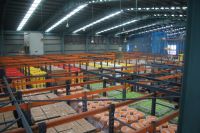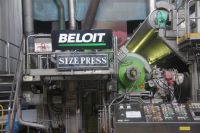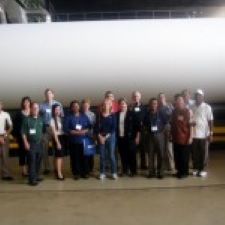Surabaya
If yesterday’s business visit took its theme from “With a chicken, we build a nation,” the motto of the group we visited, today’s two visits share a common theme in one of Indonesia’s natural resources—the forests and forest products, which have helped Indonesia flourish (partly because of the sale of commodities to China and other Asian economies), and gotten Indonesia in trouble with the green groups because of the non-sustainability issues that can accompany wanton use of forests.

 The first company was a paper producer, in a small town outside of Surabaya whose claim to fame is that it was the site of the famous Java man (one of the predecessors of homo sapiens). Having just gone through central Wisconsin, where you can see the paper mills in Wausau from ten miles away (and I remember the days when I lived in Madison and the pollutants from the paper mills led to warnings about eating fish from the Wisconsin River), I was pleasantly surprised when we arrived at the Tjiwi Kimia plant,
The first company was a paper producer, in a small town outside of Surabaya whose claim to fame is that it was the site of the famous Java man (one of the predecessors of homo sapiens). Having just gone through central Wisconsin, where you can see the paper mills in Wausau from ten miles away (and I remember the days when I lived in Madison and the pollutants from the paper mills led to warnings about eating fish from the Wisconsin River), I was pleasantly surprised when we arrived at the Tjiwi Kimia plant,  the largest single stationery manufacturing location in the world—without any advanced warning to the plant. The company, part of another one of these major conglomerates (I think it is Sinar Mas) gets its short-fiber wood for pulp from 750 plantations on Sumatra, but imports most of the long-fiber wood from the United States. The company has a plant in the United States, and owns forest land in Canada, but not in the U.S.—“America has too many rules,” said our host. The plant has 12,000 employees, about ¾ women, with the company having built a hospital and a training center. TK cannot sell directly in Indonesia (as in many countries, the laws favor the creation of jobs), but does sell to consumers globally. 75% of its products are sold globally, which can be explained partially by the per capita use of paper: Americans use 200 kg, and the Japanese even more, but Indonesians have increased their usage
the largest single stationery manufacturing location in the world—without any advanced warning to the plant. The company, part of another one of these major conglomerates (I think it is Sinar Mas) gets its short-fiber wood for pulp from 750 plantations on Sumatra, but imports most of the long-fiber wood from the United States. The company has a plant in the United States, and owns forest land in Canada, but not in the U.S.—“America has too many rules,” said our host. The plant has 12,000 employees, about ¾ women, with the company having built a hospital and a training center. TK cannot sell directly in Indonesia (as in many countries, the laws favor the creation of jobs), but does sell to consumers globally. 75% of its products are sold globally, which can be explained partially by the per capita use of paper: Americans use 200 kg, and the Japanese even more, but Indonesians have increased their usage  from 1 to 15 kilograms. On our tour of the factory, we saw a modern machine that can produce several times the amount of the original machines; the original machines came from a Taiwanese company that was about to sell them to Vietnam, when the Viet Cong rolled into Saigon and put an end to that order (in more ways than one). The current machine was made in Beloit, Wisconsin.
from 1 to 15 kilograms. On our tour of the factory, we saw a modern machine that can produce several times the amount of the original machines; the original machines came from a Taiwanese company that was about to sell them to Vietnam, when the Viet Cong rolled into Saigon and put an end to that order (in more ways than one). The current machine was made in Beloit, Wisconsin.
Lunch was an interesting stop. A mall developer invited street hawkers to set up shops inside a mall, called the village; it offered the variety of the street, with the hygienic safety of a mall. The gado-gado (a salad with peanut sauce and a bit of chili), with lychee tea, was wonderful.
The afternoon visit was to another company owned by Sinar Mas, one dealing with an even bigger villain to health-conscious environmentalists—a processor of palm oil. The company, Sinar Mas Agro Resources and Technology (SMART), has helped Indonesia overtake Malaysia as the No. 1 palm oil producer in the world. Another factor that has helped Indonesia overtake Malaysia is that the Malaysians have worn out the soil; I recall visiting the Palm Oil Board when we were in Kuala Lumpur, and they told us that Malaysia companies were buying plantations in Indonesia. A third complication was that the Malaysian forests were hiring a lot of Indonesians, since the Malaysian economy was more developed; a new minimum wage law in Indonesia resulted in a Wall Street Journal article questioning whether Malaysia could afford to continue hiring Indonesians.
Anyway, importing the palm oil kernels from plantations in Kalimantan and Papua, the plant in Surabaya processes the oil into a variety of products—mostly cooking oil, but also margarine (including in single sachet servings that would be useful for camping) and refined products for shampoo and soaps. It has factories in China and India as well—palm oil is widely used for cooking in Asia. The executives addressed several questions about the “black marketing” (boycotts) that it sounds like U.S. activists instituted. One was the charge that palm oil is high in cholesterol. They noted that cholesterol comes from animal fats—not plants (they did not mention that palm oil is high in trans fats). The other question involved taking out rainforests (Indonesia has the second largest rainforests after Brazil) to create palm oil plantations. They countered that the land was not productive, wasn’t rainforest, and created jobs—the dilemma of many environmental questions!
We got back relatively early, which meant we could have dinner on our own, and a few of us wandered over to the mall next door and ate at an Indonesian seafood restaurant. It was possible to order despite the absence of English (no English menu and no foreigners is a good combination for me), partly because of technology. One of the faculty had a telephone with a bahasa Indonesia dictionary, which helped us order 3 fish dinners—fish being probably the main source of protein at this point in the Indonesian diet.
As we say in Bahasa, “Salamat Malam”–good night.